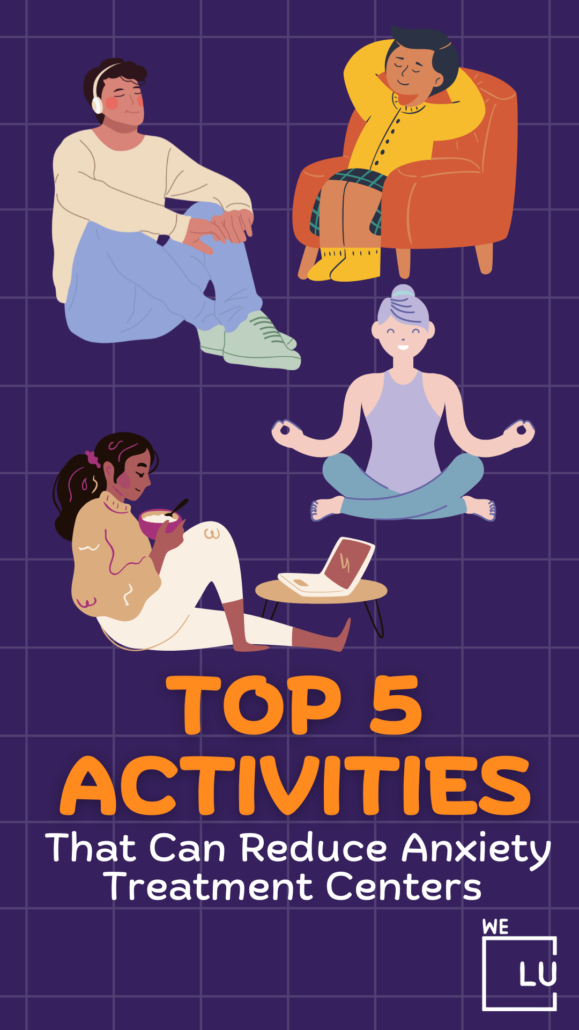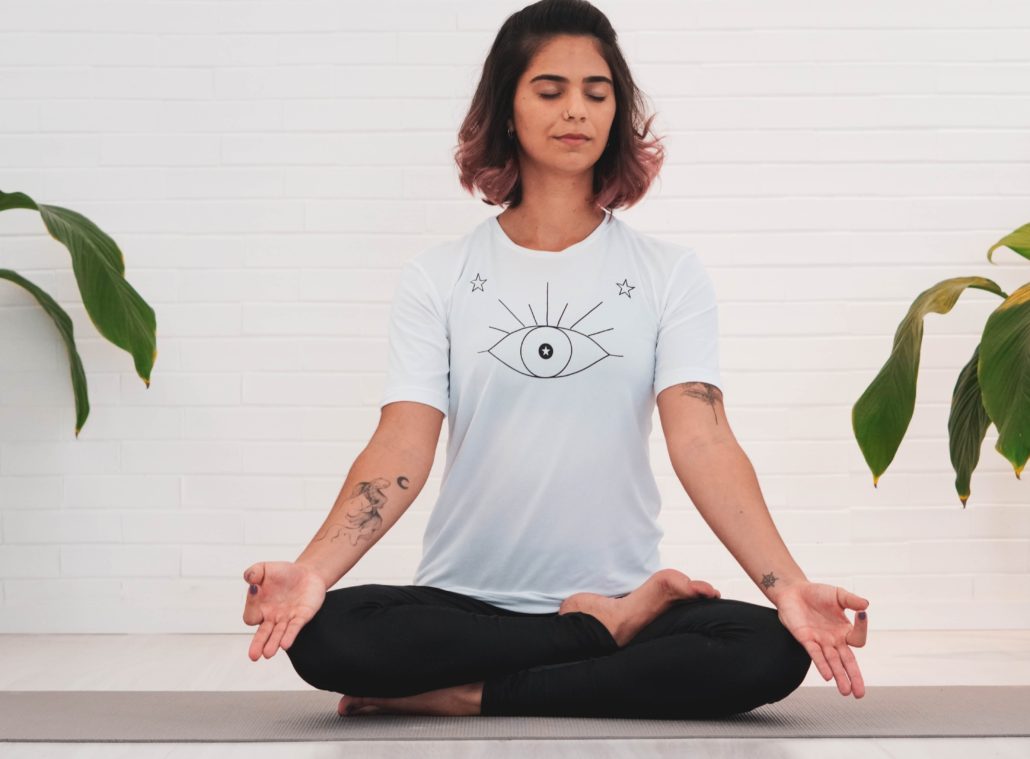Anxiety Treatment Programs
Some of the most prevalent mental health conditions in this nation include anxiety disorders. Even though it affects up to 18% of the adult population, the ailment is very treatable. Finding the best anxiety treatment program is essential, as is comprehending how the disorder affects your life or the lives of someone you care about.
Difference Between Anxiety and Depression – 5 Top Activities That Can Reduce Anxiety
Anxiety and depression difference: The fact that one term denotes a single sickness while the other denotes a collection of ailments is a significant distinction between anxiety and depression.
In reality, depression is one illness. There are numerous distinct symptoms (see below). And different people may experience it very differently. However, the term “depression” only refers to one illness.
The word “anxiety” can indicate a number of different things. We all experience anxiety occasionally, and the word “anxiety” can be used to describe that feeling simply. However, when we use the word anxiety in a medical context, it actually refers to anxiety disorder.
Some less frequent conditions are included under anxiety. These include panic disorders and phobias. However, generalized anxiety disorder is the most prevalent (GAD). In the US, a generalized anxiety disorder may affect four to five out of every 100 persons. In this post, we’ll concentrate on generalized anxiety.
What is Anxiety Disorder? Anxiety And Depression Treatment Centers
According to The National Institute on Mental Health, periodic anxiety is a standard component of life. When faced with a challenge at work, before a test, or before making a crucial decision, you could experience anxiety. However, anxiety disorders involve more than just passing apprehension or terror.
Anxiety and depression difference: It’s critical to get anxiety treatment as soon as possible since, for someone with an anxiety condition, the anxiety does not go away and can worsen over time. The symptoms might affect daily tasks like work performance, academic progress, and interpersonal connections. Generalized anxiety disorder, panic disorder, and various phobia-related disorders are only a few of the several types of anxiety disorders.
Anxiety and depression difference: People with a generalized Anxiety disorder (GAD) display excessive Anxiety or worry, most days for at least 6 months, about many things such as personal health, work, social interactions, and everyday routine life circumstances. Fear and Anxiety can cause significant problems in areas of their life, such as social interactions, school, and work.
What is Depression? Depression And Anxiety Treatment Centers
Depression (also known as Major Depressive Illness or Clinical Depression) is a common but significant mood disorder, according to the National Institute of Mental Health. It produces severe symptoms that interfere with your ability to function on a daily basis, including sleeping, eating, and working. The signs of depression must last for at least two weeks before a diagnosis may be made.
Depression treatment is required when depressive symptoms are chronic and do not go away since some types of depression are slightly different or may arise in unusual situations.
Types of Depression
- Persistent depressive disorder (also called dysthymia): is a depressed mood that lasts for at least two years. A person diagnosed with persistent depressive disorder may have episodes of major Depression along with periods of less severe symptoms, but symptoms must last for two years to be considered a persistent depressive disorder.
- Psychotic Depression: occurs when a person has severe depression plus some form of psychosis, such as having disturbing false fixed beliefs (delusions) or hearing or seeing upsetting things that others cannot hear or see (hallucinations). The psychotic symptoms typically have a depressive “theme,” such as delusions of guilt, poverty, or illness.

Skip To:
Learn More:
- Do Crystals For Depression Work?
- Depression and ADHD: What’s the Link?
- Autism and Depression Connection, Diagnosis & Treatment
- Signs of Depression in Men, Causes, & What to Know
- Rehab for Depression & Anxiety Treatment
- What is the Best SSRI for Anxiety?
- Social Anxiety Disorder
- Grounding Techniques for Anxiety Attacks
- Mental Health Poems that are Powerful and Healing
- Short-Term Disability Mental Health
- Bipolar disorder: is different from Depression, but it is included in this list because someone with bipolar disorder experiences episodes of extremely low moods that meet the criteria for major Depression (called “Bipolar Depression”). But a person with bipolar disorder also experiences extreme high – euphoric or irritable – moods called “mania” or a less severe form called “hypomania.”
- Postpartum Depression: is much more serious than the “baby blues” (relatively mild depressive and anxiety symptoms that typically clear within two weeks after delivery) that many women experience after giving birth. Women with postpartum Depression experience full-blown major Depression during pregnancy or after delivery (postpartum depression). The feelings of extreme sadness, anxiety, and exhaustion that accompany postpartum depression may make it difficult for these new mothers to complete daily care activities for themselves and/or their babies.
- Seasonal affective disorder: is characterized by the onset of Depression during the winter months, when there is less natural sunlight. This Depression generally lifts during spring and summer. Winter Depression, typically accompanied by social withdrawal, increased sleep, and weight gain, predictably returns every year in seasonal affective disorder.
- SAD Seasonal Depression (Depressed SAD): A form of depression known as seasonal affective disorder (SAD) is triggered by the changing of the seasons; it starts and ends about at the same periods each year. If you have SAD like the majority of people do, your symptoms begin in the fall and last through the winter, draining your energy and making you cranky. Typically, these symptoms go away in the spring and summer. SAD less frequently results in depression in the spring or early summer and clears up in the fall or winter. SAD treatment options include medications, psychotherapy, and light therapy (phototherapy).
Get Help. Get Better. Get Your Life Back.
Searching for Accredited Dual Diagnosis Mental Health Centers Near You?
Even if therapy failed previously, or are in the middle of a difficult crisis, we stand ready to support you. Our trusted behavioral health specialists will not give up on you. When you feel ready or just want someone to speak to about counseling alternatives to change your life call us. Even if we cannot assist you, we will lead you to wherever you can get support. There is no obligation. Call our hotline today.
FREE 24/7 Dual Diagnosis Mental Health Services HotlineAnxiety Fact Sheet
Anxiety Overview
A mental health condition marked by intense feelings of worry, anxiety, or fear that interferes with daily activities. Panic attacks, obsessive-compulsive disorder, and post-traumatic stress disorder are a few examples of anxiety disorders.
The inability to put aside worry, restlessness and stress that is out of proportion to the severity of the incident are among the symptoms.
Counseling or medicine, including antidepressants, are used as forms of treatment.
Anxiety Symptoms
Behavioral: hypervigilance, irritability, or restlessness.
Cognitive: lack of concentration, racing thoughts, or unwanted thoughts.
Whole body: fatigue or sweating
Also common: anxiety, excessive worry, angor animi, fear, insomnia, nausea, palpitations, or trembling
Anxiety Treatment
- Support group: A place where those pursuing the same disease or objective, such as weight loss or depression, can receive counseling and exchange experiences.
- Cognitive behavioral therapy: A conversation treatment that aimed to change the negative attitudes, actions, and feelings connected to psychiatric discomfort.
- Counseling psychology: A subfield of psychology that handles issues with the self that are connected to work, school, family, and social life.
- Anger management: To reduce destructive emotional outbursts, practice mindfulness, coping skills, and trigger avoidance.
- Psychoeducation: Mental health education that also helps individuals feel supported, validated, and empowered
- Family therapy: psychological counseling that improves family communication and conflict resolution.
Anxiety Statistics
It’s critical to understand the distinction between anxiety and depression. Anxiety, in its most basic form, is an excessive feeling of worry, whereas depression, in its most basic form, is an excessive feeling of worthlessness and hopelessness. It is conceivable for someone to experience depression and anxiety simultaneously.
6.8 million
GAD affects 6.8 million adults or 3.1% of the U.S. population, yet only 43.2% are receiving treatment.
Source: National Institute on Mental Health
19 million
19 million adults experience specific phobias, making it the most common anxiety disorder in America.
Source: ADAA, 2020
17.3 million
Major depressive disorder affects approximately 17.3 million American adults or about 7.1% of the U.S. population aged 18 and older.
Source: National Institute of Mental Health

End the Emotional Pain. Get Your Life Back.
Feeling Depressed, Anxious or Struggling with Mental Health Illness? Get Safe Comfortable Mental Health Dual Diagnosis High-Quality Therapy From Counselors That Care. Begin Your Recovery Now.
Hotline (855) 940-6125
How to reduce anxiety? Inpatient Anxiety Treatment Centers
Anxiety can feel uneasy or even like dread. But, there are plenty of ways to reduce anxiety. Do you have techniques that you can use at any moment of the day to reduce your distress? Today we invite you to look at the Top 5 activities that have been proven effective when we need a little help to continue our daily routine.
5 Top Activities That Can Reduce Anxiety – Best Anxiety Treatment Centers Near Me
1. Identify and Learn to Manage Your Triggers – Treatment Centers For Depression And Anxiety
With a therapist or on your own, you can discover triggers. Sometimes they are plain to see, such as when you consume caffeine, alcohol, or smoke. Sometimes they may not be as obvious.
Long-term issues, such as those involving money or the workplace, may take some time to identify—is it a deadline, a person, or the circumstance? Through therapy or with friends, this can require some additional help.
When you do identify your trigger, you should make every effort to reduce your exposure. Using alternative coping mechanisms may be helpful if you are unable to minimize it, such as if it is caused by a stressful work environment that you cannot currently change.
First-class Facilities & Amenities
World-class High-Quality Mental Health Services & Behavioral Health Substance Abuse Treatment
Rehab Centers TourRenowned Mental Health Centers. Serene Private Facilities. Inpatient Rehab Programs Vary.
Mental Health Helpline (855) 940-6125Proven recovery success experience, backed by a Team w/ History of:
15+
Years of Unified Experience
100s
5-Star Reviews Across Our Centers
10K
Recovery Successes
- Comprehensive Dual-Diagnosis Treatment
- Complimentary Family & Alumni Programs
- Coaching, Recovery & Development Events
- Comfortable Onsite Medical Detox Center
2. Adopt Cognitive Behavioral Therapy (CBT) – Anxiety Treatment Centers In Florida
CBT teaches individuals many ways to view and respond to events that cause anxiety. You can change harmful thought patterns and actions before they spiral with the assistance of a therapist.
3. Do a Daily or Routine Meditation – Residential Anxiety Treatment Centers
Though it takes some work to get the hang of it, attentive meditation over time can eventually teach your brain to block out anxious thoughts when they come to mind.
Start with yoga or walking meditation if staying still and paying attention is challenging for you. You can get started by using one of the many free guided meditations available on apps like InsightTimer.

4. Keep a Journal – Best Residential Treatment Centers For Depression And Anxiety
Making it a routine to record your thoughts and feelings in a journal every day might be beneficial. For some people, simply writing their thoughts down can be comforting. However, it can also assist you in keeping note of when, how, and what kinds of situations cause your anxiety.
5. Socialize – Residential Treatment Centers For Depression And Anxiety
Spending regular time with friends and family can help you manage your anxiety, even though everyone is different and not everyone has social anxiety.
Stress reduction, laughing, and a sense of community are all boosted by social interaction, which also lessens loneliness. According to research, social interaction can eventually increase your stress tolerance.
World-class, Accredited, 5-Star Reviewed, Effective Mental Health Dual Diagnosis Programs. Complete Integrated Inpatient Rehab with Free Post Discharge Therapy Planning.
CALL (855) 940-6125End the Emotional Pain Rollercoaster. Gain Stability & Happiness Through Recovery Treatment. Start Mental Health Counseling Today. Get Free No-obligation Guidance by Behaviroal Health Specialists Who Understand Mental Health Recovery.
Other Anxiety Tips
Try Supplements or Change Your Diet – Best Anxiety Treatment Centers
Changes to your diet or the use of supplements are unquestionably long-term solutions. According to research, several vitamins or nutrients can reduce anxiety.
These consist of:
- Lemon balm
- Omega-3 fatty acids
- Ashwagandha
- Green tea
- Valerian root
- Kava kava
Before your body is able to fully utilize the nourishment that these herbs and foods offer, it may take a few months. Make cautious to talk to your doctor about herbal treatments if you’re taking other prescriptions because there could be negative side effects.
Keep your body and mind healthy – Treatment Centers For Anxiety
Anxiety symptoms can be prevented by exercising frequently, having a balanced diet, getting adequate sleep, and maintaining relationships with loved ones.
Need Anxiety Help Today?
If you’re having difficulty managing your anxiety, you may want to consider reaching out to a mental health expert. We Level Up FL treatment center is ready to provide you with additional tools to manage your symptoms and discover the root causes of your anxiety.
At We Level Up Treatment Center provides world-class care with round-the-clock medical professionals available to help you cope. In addition, we work as an integrated team providing information about grounding techniques for anxiety and other aspects of treatment. Make this your opportunity to reclaim your life. Call today to speak with one of our treatment specialists. Our specialists know what you are going through and answer any of your questions. Your call is private and confidential, and there is never any obligation.
Experience Transformative Recovery at the We Level Up Treatment Center.
See our authentic success stories. Get inspired. Get the help you deserve.



Start a New Life
Begin with a free call to a behavioral health treatment advisor. Learn more about our dual-diagnosis programs. The We Level Up treatment center network delivers recovery programs that vary by each treatment facility. Call to learn more.
- Personalized Care
- Caring Accountable Staff
- World-class Amenities
- Licensed & Accredited
- Renowned w/ 5-Star Reviews
We’ll Call You
We Level Up Dual Diagnosis Treatment & Treatment Centers For Anxiety And Depression
The definition of dual diagnosis (also referred to as co-occurring disorders) can differ between institutions. However, it is generally described as the specific treatment of someone who has been diagnosed with a substance use disorder and a mental health disorder at the same time. Treating dual-diagnosis clients is a critical aspect of our inpatient treatment experience because co-occurring disorders are strongly correlated with instances of substance abuse.
Creating a treatment plan that addresses the physical aspects of withdrawal, the psychological connection with drug use, and managing underlying mental health disorders is part of setting clients up for success. A thorough mental health analysis identifies possibilities for treatment. Meeting with mental health counselors and medical care providers means access to behavioral therapy and medication treatment. At our dual diagnosis treatment center, We Level Up can implement the highest quality of care.
We recognize the fragile complexities of how mental and substance abuse disorders can influence others and sometimes result in a vicious cycle of addiction. That’s why we offer specialized treatment in dual-diagnosis cases to provide the most excellent chance of true healing and long-lasting recovery.
It can be challenging to accept that you may be living with a mental illness, but once it is properly diagnosed and treated, treating the presenting case of substance abuse can be magnitudes easier. Only a properly trained medical professional can diagnose these underlying conditions. If you believe you are suffering from a disorder alongside addiction, we urge you to seek a qualified treatment center to begin your journey to recovery. Call We Level Up today.
Search We Level Up FL Depression and Anxiety Resources
Sources
[1] National Institute of Mental Health – ‘Depression’ (www.nimh.nih.gov)
[2] U.S. Food and Drug Administration (FDA) (www.fda.gov/)
[3] Depression Treatment » Drug Alcohol Addiction Rehab
[5] NIMH – https://www.nimh.nih.gov/health/publications/social-anxiety-disorder-more-than-just-shyness
[6] Selective Serotonin Reuptake Inhibitors – National Center for Biotechnology Information, U.S. National Library of Medicine
[7] ‘Anxiety Disorders’ – National Institute Of Mental Health (Nimh.nih.gov)
[8] Psychopharmacology of anxiety disorders – National Center for Biotechnology Information, U.S. National Library of Medicine
[9] Products – Data Briefs – Number 379 – September 2020 (cdc.gov) Depression – National Institute of Mental Health
[10] Coping with Stress – Centers for Disease Control and Prevention
